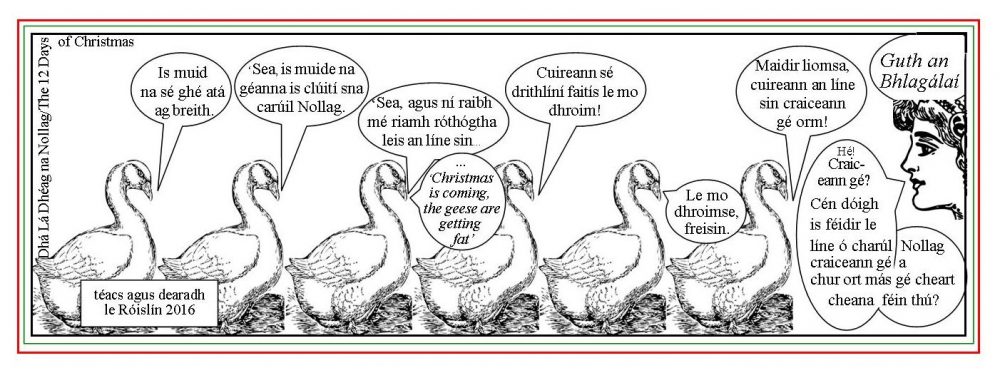Ar an 4ú, an 5ú, an 6ú agus an 7ú lá den Nollaig (birds, rings, and poultry for the 4th, 5th, 6th, and 7th days of Christmas) Cuid/Part 1/2 Posted by róislín on Dec 27, 2016 in Irish Language
(le Róislín)

grafaicí: aghaidh mná: ww.publicdomainpictures.net/view-image.php?image=157631&picture=woman-profile-portrait-clipart; gé: http://www.clker.com/clipart-11902.html
Now that we’ve got three of the twelve verses under our belt, céard faoi dornán níos mó? Today’s blogpost will cover some phrases from days 4, 5, 6 and 7 of “The Twelve Days of Christmas” (Dhá Lá Dhéag na Nollag). Earlier in this blog, we’ve dealt with other aspects of this famous song, especially as a way to expand our vocabulary; a full webliography of the series is given below (thíos).
Our topics for today are: lonta dubha, fáinní óir, géanna ag breith, agus ealaí ag snámh. Those forms were all plural. So what happens when we want to put them after a number, for example, to say, “seven swans a-swimming” … <tormáil drumaí> … they go back to being singular, since, as I’ve said before, that’s the standard pattern in Irish: nouns are singular when they directly follow numbers (dhá chat, trí mhadra, srl.).
So let’s hop to it and examine our nouns and numbers. I’m going to start with “lon dubh” as the “colly” or “coaly” bird, for reasons discussed in previous blogs (see the webliography below). If anyone wants, they can substitute “ag glaoch,” which would mean “calling” and use it with “éan” instead of “lon dubh,” which is a blackbird (i.e. colly or coaly bird).
lon dubh, a blackbird
lonta dubha, blackbirds
ceithre lon dhubha, singular form of “lon” and “dubh” is lenited (adding the first “h” and pluralized (adding the “a”)
Next we have “na fáinní óir,” which may in fact be “ring-necked pheasants,” but for now, will stick with the standard interpretation of “fáinne” as a ring one wears.
fáinne óir, a gold ring
fáinní óir, gold rings
cúig fháinne óir, five gold rings, with the “fh” completely silent in pronunciation
Next up, or should I say, settled down (ina gcuid neadacha), na géanna ag breith,
gé ag breith, a goose a-laying
géanna ag breith, geese a-laying
sé ghé ag breith [shay yay egg brzheh], six geese a-laying. That “egg” in the pronunciation guide is no reference to the word “breith,” it’s just the pronunciation of the Irish “ag,” which is unlike the “ag” of “agam, agat,” etc. Nor is it like the “ag-” of “agus” or, for that matter, of “agús” (which just happens to sound like “a goose”!). A key pronunciation point here is that the “gh” of “ghé” is like an English “y” as in “year” or “yeanling.”
And finally (do bhlagmhír an lae inniu), na healaí ag snámh.
eala ag snámh, a swan a-swimming
ealaí ag snámh, swans a-swimmng
seacht n-eala ag snámh, seven swans a swimming. Eclipsis after “seacht” gives us the “n-” prefix. The plural ending (“-í”) drops out, as we would expect.
So that’s seven done, cúig cinn le déanamh. SGF — Róislín
Blaganna Eile faoin Amhrán Seo:
2010: Dhá Lá Dhéag na Nollag (The Twelve Days of Christmas), Posted on 25. Dec, 2010
2010: Cearca Francacha agus Lonta Dubha (Cuid a Dó don tSraith: Dhá Lá Dhéag na Nollag) Posted on 29. Dec, 2010
2010: “Ór,” “Óir” or “Órga”? “Fáinne” or “Éan”? Éan?! (Cuid a Trí: Dhá Lá Dhéag na Nollag) Posted on 31. Dec, 2010
2011: Géanna agus Ealaí (Cuid a Ceathair: Dhá Lá Dhéag na Nollag) Posted on 04. Jan, 2011
2011: Na hUimhreacha Pearsanta i nGaeilge (Irish Personal Numbers and Cuid a Cúig or the Last Installment of Dhá Lá Dhéag na Nollag) Posted on 06. Jan, 2011
2012: Bunuimhreacha, Orduimhreacha is Maoluimhreacha — A Thiarcais! (Oh my!) Posted on 25. Dec, 2012
2013: Speaking of Pigeons (Colúir)Posted on Dec 14, 2013
2013: (Cé Mhéad Patraisc? Cé Mhéad Drumadóir? (or ’12 Lá na Nollag’ Redux and an Irish Counting Lesson to boot) Posted on 18. Dec, 2013
2015: The Irish Twelve Days of Christmas Redux Redux with a Blogliography of Other Blogs on the Song Posted on Dec 25, 2015
2016: Cén sórt éin? Cén sórt crainn? — Learning Irish from the Christmas Carol ‘Dhá Lá Dhéag na Nollag’ (12 Days of Christmas) Posted on Dec 20, 2016
2016: Ar an 2ú agus an 3ú lá den Nollaig – dhá fhearán, trí chearc fhrancacha (2 turtledoves, 3 French hens, for the 2nd and 3rd days of Christmas) on Dec 24, 2016

Build vocabulary, practice pronunciation, and more with Transparent Language Online. Available anytime, anywhere, on any device.




Leave a comment: